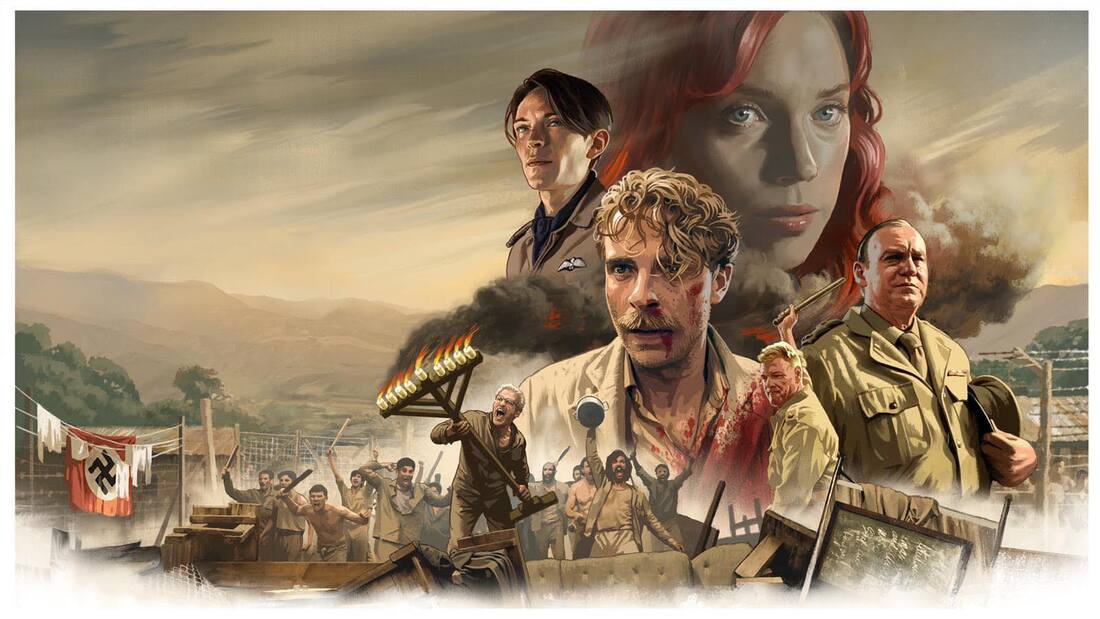When did you first read the Outcast comics?
After I got this job, I read the first comic, and then I stopped reading them. I’m not really a huge comic book fan, if I’m honest. I know I shouldn’t be saying that, but I’ve got to be truthful. I wanted to see what the layout was like, and see the content, and just kind of see what all the fuss was about with these things. Because I know how big it is, and how huge the whole Comic Con thing is, and so in that respect, to see what people find in these comics. Because I know they’re a huge thing for a lot of people.
How would you describe Reverend Anderson?
Troubled. Tormented soul. Smokes too much. Drinks too much. I mean that’s kind of how I describe him, I guess, from certainly doing these scripts. But, you know, he’s on a mission. He’s on a mission to put things right. Whether he proves that he’s correct in that or not, I don’t know. I think he made a choice—in my opinion, a bad choice. Is it family or is it his mission? He went for the mission thing, and I would never trust a person like that in real life. They put that over their family; either they’re power-crazed or just crazy.
Before you guys were getting started, what were the conversations you had with Robert, Chris? Was there anything interesting in those conversations in advance?
We didn’t really speak— I don’t remember speaking that much about it, because it all came about so quickly. And they were getting the scripts together. I had spoken to them over Skype and stuff. The pilot script was good. It was clear. It seemed to come off the page, and you just go with your instinct, your gut instinct as an actor on how to play it. So I just went for it like that. And they seemed— Well, they asked me back, so I must have done something right.
What do you think the driving force of Reverend Anderson is?
Rooting out demons. He obviously specializes in exorcism, but he’s not very good at them. He doesn’t have the touch, the gift, that Kyle has. I just think it’s that mission to right wrongs, basically. It’s as basic as that. How he goes about it is open to question. That’s for the audience to decide. I don’t like to analyze too much. I like to just get along, do the work. It’s my interpretation of the comic book, and the audience will make of it what they will.
Did you build any backstory?
No, no I don’t really do that. It was all— His backstory is in the scripts. We learn in one of the episodes—I think it’s episode 2, quite early on, which is good—that he goes to see his ex-wife, because things are starting to crumble around him and he starts losing control. Maybe that’s it! Maybe he’s a control freak. And he goes to see his ex-wife and basically says, we built this thing— And she says, listen, I made my decision and you made yours, and we can’t go back on this now. I’ve moved on and so should you. The only thing I would say is in terms of the character—because people ask me “Oh, did you go on YouTube and watch loads of exorcisms?” I said what happened was, my family and I were out here in the beginning of August, and we were watching TV together in bed, and we were just flicking around. And then this evangelical kind of service started going on. And this young guy, you know real trendy ripped jeans, tight t-shirt, buff, and he was owning that stage that he was on. He was absolutely owning the stage. And he was sitting on the end of the stage and just chatting to his flock. And they were all like “Jesus saved me!” and all that. And I thought, this guy is good. He’s seriously—this is a good actor. You know? And it suddenly occurred to me, what he kind of is is a bit of a rock star. And I kind of figured that’s what Anderson is when he’s doing his sermons to his flock. I had to do a big 3-page sermon in episode 2, and I said to Howie, rather than just to be stuck up behind the podium, doing it from there and ranting, it would be great to go down there into the crowd and use that kind of space and get really in people’s eye line and really make that eye contact that draws them in. It’s having that kind of power. So that’s really the only thing that I took. And that’s what I played with.
I wanted to ask you about one prop. You have one of the most interesting props, the tool kit.
My tool kit, yeah! Available at all good stores, coming soon. I plan to market “Get Your Own Exorcism Kit.” You know, get your sage, your bible, your cross. I think we could do a roaring business.
Is it fun to use that?
Do you know what? Those scenes, you know they look amazing on screen when they’re all cut together and edited and all that. But to shoot, they’re terribly dull for actors. Because you’re looking at the kid—he’s not there—you’re just imagining him. So you’re going like, look, oh my god he’s throwing up! Oh, okay. I think one of my concerns for this, which hasn’t happened thank goodness, is that I didn’t want the show, certainly my character, to have an exorcism of the week. “Who’s going to be the demon of the town this week?” You know, it becomes a little like Batman or something. You know what I mean? And becomes too formulaic and repetitive. And that’s when you start getting into trouble. It’s a much stronger piece. You know, the undercurrent of the piece is so much stronger than that. So we have a few exorcisms and things, but it’s just kind of— Personally, I don’t like them, because I have to learn this flowery language, and it’s much, much harder to learn. And I have a lot of dialogue, and what I can do without… I kept saying to Chris and the guys, Guys, you’ve got to—I can do this with a look, man. Do it with a look. Take this out. Because I can’t— It’s hard to learn that stuff. Do you know what I mean? Because it doesn’t really make sense to you. When you start quoting the Bible, I’m like “What the—” It’s like, you know, you need time, because I’m 52 and the brain does not function as fast as it used to. It’s okay for these youngsters, like Patrick and all that, because they’re young.










